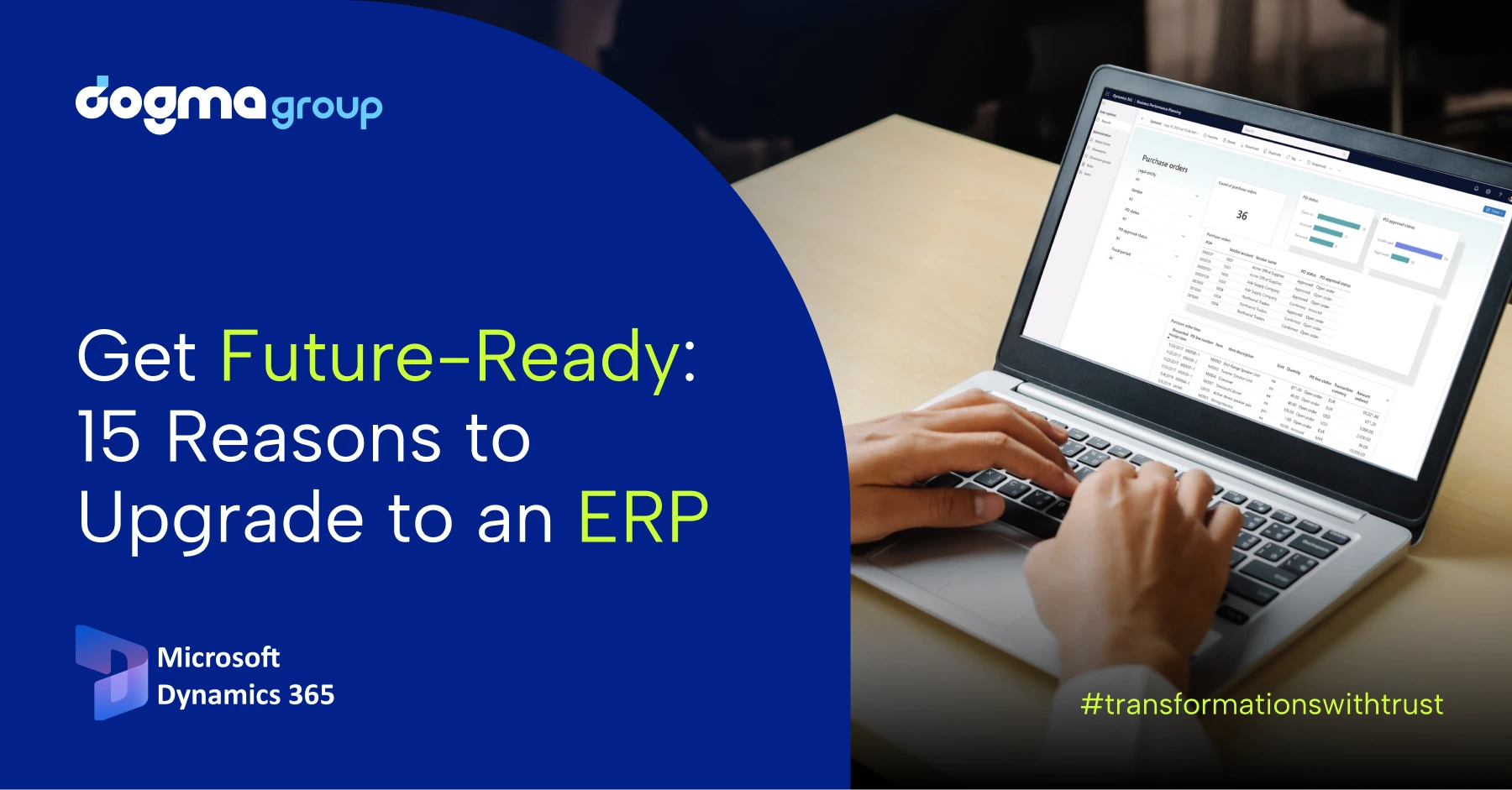Growth comes with its own set of challenges. As businesses expand, the cracks in their existing systems start to show. Processes that once felt manageable become inefficient. Data sits in silos, finance teams grapple with manual reconciliations, supply chains experience delays, and HR faces hurdles with workforce management.
These inefficiencies don’t appear overnight, but they become impossible to ignore. When everyday tasks begin taking longer than they should, and teams are bogged down with manual work instead of focusing on strategic goals, it’s a clear sign that your organisation has outgrown its current systems.
This is where an ERP (Enterprise Resource Planning) system comes in. It’s more than just software—it’s a unified platform that streamlines processes, eliminates redundancies, and provides leaders with the data-driven insights they need to make smarter, faster decisions.
Without an ERP solution, your business risks being reactive instead of proactive. Your teams will spend more time troubleshooting and less time driving growth and innovation. But it doesn’t have to be that way.
In this blog, we’ll explore everything you need to know about ERPs—what they are, how they work, and most importantly, how they can make your business more efficient, agile, and ready for the future.
What is an ERP system?
At its core, an ERP system is a game-changer. It’s a business-enablement technology that connects the dots across your organisation—from finance and HR to supply chain and customer service. Instead of juggling multiple, disjointed tools, an ERP brings everything together into one shared database.
This centralised system allows you to automate key processes, track performance in real-time, and make smarter decisions backed by accurate, up-to-date information. With the right ERP, you can say goodbye to manual data entry, human error, and scattered workflows.
If you’ve used an ERP solution before, especially an older one, you probably know the basics—finance gets tighter controls, HR gets better workforce management, and operations run more smoothly. But modern ERPs take it up a notch. They give you better forecasting, faster decision-making, and fully integrated tools that help every department work in sync.
Here’s a glimpse of how different departments benefit:
- Finance can streamline payments, eliminate errors, and ensure compliance—driving profitability.
- HR can manage leave requests, handle payroll, and track workforce data more effectively. Integrated Human Capital Management (HCM) tools make recruitment, onboarding, and talent development a breeze.
- Manufacturing & Supply Chain get the clarity they need to track production, expedite deliveries, and reduce delays. From inventory control to logistics tracking, every process runs faster and smoother.
- Sales & Customer Service teams can manage promotions, drive online sales, and create better customer experiences—all from a single source of truth.
If you’re new to ERPs or unsure about how they could help your business, you’re in the right place. Stick around as we break it all down and show you why investing in an ERP is one of the smartest moves your business can make.
1. Centralised Data Management
Data silos are one of the biggest hurdles for growing businesses. ERP systems eliminate these silos by unifying data from finance, sales, HR, and supply chain into a single, centralised platform. This centralised view enables faster, more accurate decision-making at all levels of the organisation. For instance, finance teams can track cash flow in real-time, while supply chain managers gain visibility into stock levels, enabling them to address shortages before they impact operations. By having all key data in one place, organisations can operate with clarity and agility.
2. Advanced Data Security
Cybersecurity threats continue to rise, and businesses face the constant challenge of safeguarding sensitive information. Modern ERP solutions come with multi-layered security protocols, such as multi-factor authentication, data encryption, and automatic system updates. Cloud-based ERPs add an extra layer of protection through secure, distributed data storage. Unlike traditional on-premise systems, cloud-based ERPs employ continuous security monitoring and AI-driven threat detection. This comprehensive approach to security ensures that sensitive information—customer details, payroll data, and operational records—remains protected from breaches.
3. Enhanced Productivity Through Automation
Automation is no longer just “nice to have”—it’s a necessity. Manual processes slow down operations and drain employee productivity. ERP systems solve this by automating repetitive tasks like purchase orders, invoice processing, payroll, and HR workflows. Powered by AI and machine learning, these automation tools free up employees to focus on strategic, high-impact initiatives. The result? Greater productivity, faster processes, and a more engaged, satisfied workforce.
4. Regulatory Compliance Made Simple
Compliance requirements are becoming increasingly complex, with laws like GDPR and SOX imposing strict standards on data handling and reporting. ERP solutions make compliance manageable by offering features like automated audit trails, compliance checklists, data governance protocols, and risk assessment tools. Real-time tracking and reporting capabilities ensure that businesses remain compliant with industry regulations, reducing the risk of fines and legal issues.
5. Real-Time Visibility for Informed Decision-Making
The pace of modern business demands real-time data. Simply waiting for end-of-month reports is no longer an option. Today’s ERP dashboards provide live insights into key performance indicators (KPIs) across finance, operations, and HR. Leaders can monitor cash flow, production schedules, and workforce performance at any given moment. This visibility allows for proactive decision-making, enabling businesses to respond to changes in demand, supply chain disruptions, or market shifts as they happen. Real-time insights lead to smarter, faster decisions that keep the business ahead of the curve.
6. Scalable Solutions to Support Growth
As businesses grow, so do their operational needs. ERP systems support this growth by offering modular, scalable solutions that evolve with the business. Companies can start with core functionalities, such as finance and inventory, and add more advanced modules like CRM, supply chain, or HR as they expand. This “pay-as-you-grow” model ensures businesses only pay for what they need, avoiding large, upfront costs for features they may not use immediately.
7. Remote Work & Mobile Access
Remote work has become a standard business practice, making mobile access to business systems non-negotiable. ERP solutions now offer mobile apps that give employees access to critical data, update records, and make approvals from anywhere. Whether it’s a sales rep closing a deal on the road or a manager approving purchase orders remotely, mobile ERP access ensures continuous productivity. This flexibility also supports hybrid work models, making businesses more attractive to top talent.
8. Cost Efficiency and ROI
ERP systems aren’t just operational tools—they’re a smart financial investment, which is perhaps one of the most overlooked benefits of ERP systems. By automating processes, centralising data, and enabling more effective resource allocation, ERP systems lower operating costs. For example, better inventory management can reduce stockouts and overstocking, while automated workflows cut down on administrative overhead. These efficiencies add up, delivering a faster return on investment (ROI) and long-term cost savings.
9. Collaboration Across Departments
Gone are the days of disconnected departments working in isolation. ERP systems provide a single source of truth, enabling seamless collaboration across marketing, sales, HR, finance, and operations. For instance, marketing teams can access up-to-date CRM data, while production teams use supply chain data to forecast demand. This interconnected approach reduces miscommunication, aligns departmental goals, and ultimately drives faster project completion.
10. Flexibility and Adaptability
Business needs change quickly, and rigid systems can’t keep up. Unlike their traditional iterations, modern ERP solutions offer low-code and no-code configurability. Businesses can adjust workflows, create or customise new reports, add modules, or introduce new processes without relying on IT support. This flexibility allows businesses to pivot during times of crisis or seize new market opportunities with minimal disruption.
11. Superior Customer Service
Customer experience is now a key differentiator for businesses, and ERP solutions play a pivotal role in delivering it. ERP systems empower customer service teams with a complete view of customer interactions, order history, and payment status. This 360-degree perspective allows for faster issue resolution, more personalised service, and stronger customer relationships. When customers feel seen and valued, brand loyalty grows.
12. Streamlined Workflows
Manual workflows can bottleneck business operations, causing delays and errors. ERP systems address this by standardising workflows across departments. From automating HR onboarding processes to standardising procurement workflows, ERPs enable consistent, efficient processes. As a result, response times are faster, production cycles are shorter, and operational efficiency improves.
13. Data-Driven Reporting & Insights
Data is only valuable if it leads to action. ERP systems offer advanced analytics and business intelligence (BI) capabilities, converting raw data into meaningful business insights. Companies can generate reports on financial forecasts, sales trends, or production performance in minutes, not days. With predictive analytics, businesses can anticipate future trends and make proactive decisions, leading to more strategic planning and better outcomes.
14. Smarter Forecasting with AI and ML
AI-driven predictive analytics is transforming how businesses plan for the future. ERP systems leverage machine learning algorithms to detect trends, predict market shifts, and forecast demand. This future-focused approach allows companies to respond proactively rather than reactively, enabling them to avoid overproduction, minimise bottlenecks, and respond to future customer needs before they arise. And inevitably, businesses that can predict the future are better positioned to succeed in it.
15. User-Centric Design for Better Adoption
Older ERP systems were known for being clunky and difficult to use. Modern ERP solutions prioritise user experience, featuring intuitive interfaces, drag-and-drop tools, and guided workflows. New employees can get up to speed quickly, reducing training time and increasing adoption rates. When employees find the system easy to use, they engage with it more, driving higher adoption rates and productivity across the board.
How to Choose the Right ERP System
With so many benefits on offer, an ideal ERP system could be a game-changer for your business. But how do you pick one that fits your business? Here’s what to prioritise when evaluating ERP options:
- Scalability & Growth Support: Ensure it grows with your business.
- Automation & Data Centralisation: Look for systems that reduce manual processes.
- Customisation Capabilities: Choose a system that can be tailored to your workflows.
- Mobile & Cloud-Based Access: Remote work demands mobile access.
- Seamless Integration: Make sure it integrates with CRM, HR, and finance systems.
One standout solution is Microsoft Dynamics 365, which offers all of the above—and more. With modules like Finance, Business Central, Supply Chain Management, and Project Operations, it covers every facet of business operations. Unlike older ERP systems, Microsoft Dynamics 365 goes beyond the basics, integrating AI, predictive analytics, and Power BI reporting for actionable, real-time insights.
Your Next Move
Still wondering if ERP is right for your business? Let’s make it easy. With Dogma as your ERP partner, you’re backed by a team that’s spent decades helping businesses succeed with ERP solutions like Microsoft Dynamics 365.
Get in touch with us at 01296 328 689 or https://dogmagroup.co.uk/contact-us/.
(Dogma is a certified partner of Microsoft Dynamics 365)






